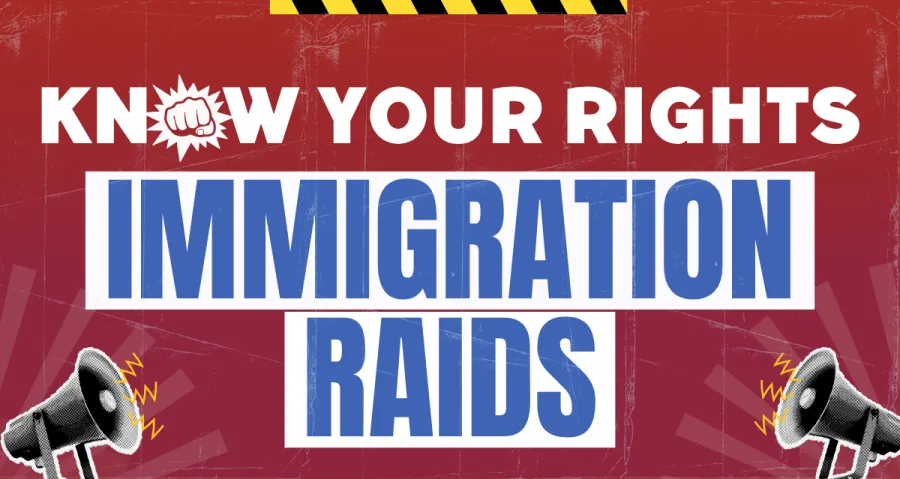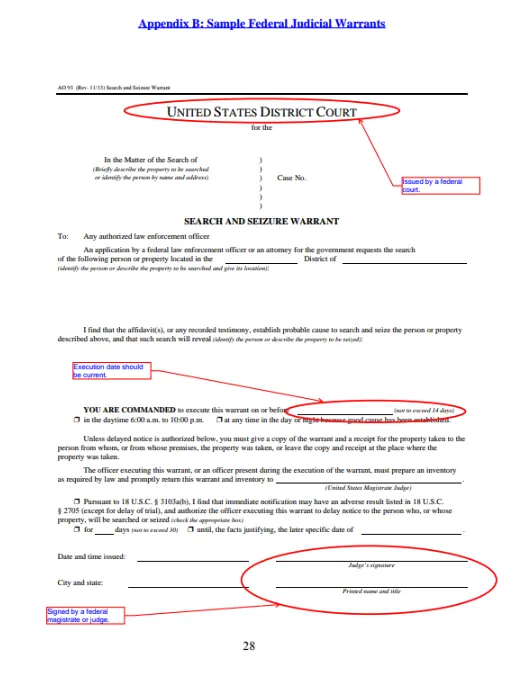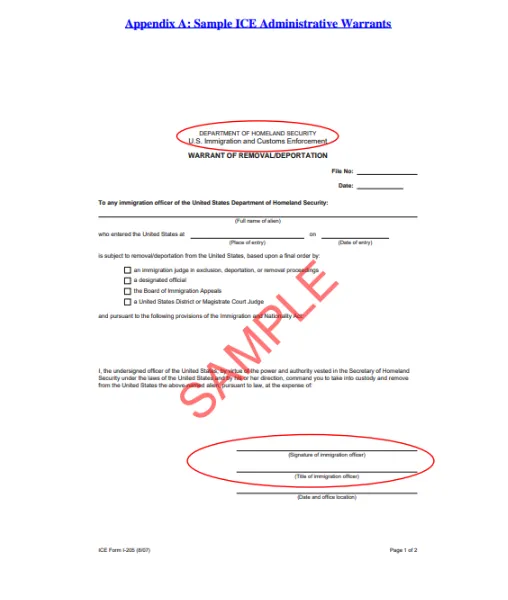KYR Immigration Raids

Everyone deserves to feel safe at work and in our communities regardless of their citizenship or immigration status. There are a number of great resources about your rights and how to protect yourself, your coworkers, and loved ones in the case of a workplace or community raid.
Please note: This page is not legal advice, this page a compilation of public resources and public information.
If ICE enforcement shows up at your workplace
If ICE enforcement shows up at your front door
If you are questioned by ICE in public or on the street
Understanding Federal Judicial Warrants & Administrative Warrants
If ICE enforcement shows up at your workplace:
- Do Not Talk To ICE Enforcement: Designate one trained staff member to communicate with ICE enforcement if necessary. All other employees should not engage with ICE enforcement. If questioned, staff should respond, "I do not have the authority to talk to you, please talk to (designated person).”
- Deny Access To Private Areas: ICE enforcement cannot enter a private area of a workplace without a judicial warrant signed by a judge or explicit consent from the employer. ICE may enter public areas such as lobbies but cannot access offices or other restricted areas. It is important to clearly identify which areas of your worksite are not open to the public. Use signage whenever possible (e.g., “Employees Only” or “No Public Access”) to make these areas clearly designated as private.
- If an ICE agent wants to enter a private area, you can say, "This is a private area. You cannot enter without a judicial warrant signed by a judge. Do you have one?"
- Stay Silent: If ICE enforcement questions you about your immigration status or about the whereabouts of an employee, you have the right to remain silent. If you want to exercise that right, you should say it out loud.
- Do Not Sign Anything: If you are asked to sign anything, ask to contact your attorney. Do not sign anything without speaking to a lawyer first.
If ICE enforcement shows up at your front door:
- Do Not Open The Door: Under the law, immigration officers cannot enter your home without a warrant signed by a criminal court judge. Ask the immigration officer to slide the warrant under the door and verify that the warrant is official and properly signed by a judge.
- Example of judicial warrant.
- Stay Silent: You have the right to remain silent. If you want to exercise that right, you should say it out loud.
- Do Not Sign Anything: If you are asked to sign anything, ask to contact your attorney. Do not sign anything without speaking to a lawyer first.
If you are questioned by ICE in public or on the street:
- Ask if you are free to go: If they say yes, walk away calmly. Do not run or flee, as it can be used as a reason to detain you.
- If you are being questioned, stay silent: You have the right to remain silent. If you want to exercise that right, you should say it out loud.
- You have the right to refuse consent: ICE enforcement is not allowed to search of your vehicle, personal property and home without your consent or without a judicial warrant.
- Example of judicial warrant.
- You have the right to contact a lawyer or embassy: If you are being interrogated by ICE enforcement you have the right to request to talk to a lawyer or get in contact with your embassy, if you are not a citizen of the United States.
- Do Not Sign Anything: If you are asked to sign anything, ask to contact your attorney. Do not sign anything you without speaking to a lawyer first.
Understanding Federal Judicial Warrants & Administrative Warrants
Judicial warrants are issued by a judge after reviewing evidence of probable cause. ICE agents with a judicial warrant have the legal authority to enter your home and make arrests. However, a valid judicial warrant has to have the following:
- Titled 'United States District Court'
- Signature of a judge or magistrate.
- Full name of person or business.
- Exact address including apartment and unit number.
- A execution date which is current.

Administrative warrants are issued by the Department of Homeland security, not a judge, and typically used for specific immigration enforcement purposes. ICE agents with an administrative warrant do not have the authority to enter your home or a private area of a worksite without consent.
If ICE presents an administrative warrant you do not have to open the door or grant them access to private areas of a worksite.
These type of warrants only grant ICE the authority access public spaces and detain in public spaces.

Red Cards
All people in the United States - regardless of immigration status - have certain rights and protections under the U.S. Constitution. The Red Card is a card that provides information about your rights if you encounter immigration authorities. The Immigrant Legal Resource Center created the Red Card to help people understand and assert their rights.
Red Cards are available in 49 languages. Click here to print your own Red Cards from the ILRC.

You can also submit a local request for red cards by emailing info@afscmemd.org.
Additional Resources
- DMV Migrant Resources by MDCEP
- Migrant Solidarity Mutual Aid (MSMA) Free Hotline: (202)-335-1183
- CASA Free Hotline: (888)-214-6016
- Know Your Rights app by NAKASEC which can read your rights out loud to an ICE or law enforcement agent and send a message to an emergency contact.
- Immigration Resources from the AFL-CIO
- Know Your Rights Toolkit from CASA
- Virtual Trainings from AFSCME National Union
